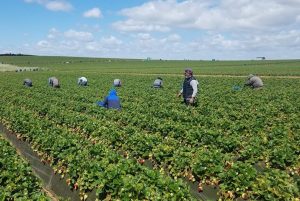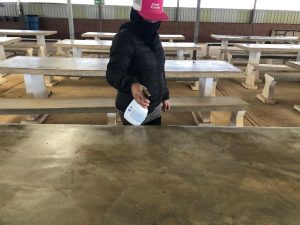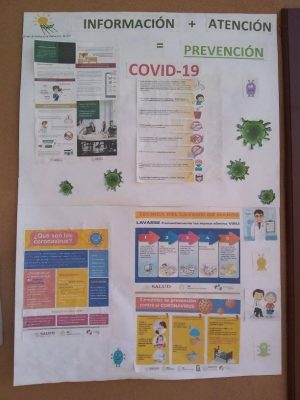 National Farmworker Awareness Week (March 25-31) took place this year against the backdrop of social distancing efforts and statewide lockdowns due to COVID-19, shining a distinct light on the essential work of farmworkers and their important contribution to the food supply.
National Farmworker Awareness Week (March 25-31) took place this year against the backdrop of social distancing efforts and statewide lockdowns due to COVID-19, shining a distinct light on the essential work of farmworkers and their important contribution to the food supply.
Even with the heightened awareness of the vital role farmworkers play in society and the economy, various media outlets have reported that many aren’t hearing from their employers about how to best protect themselves from the coronavirus while on the job.
In this time of global crisis, EFI certified farms are seeing more engagement as EFI Leadership Teams use their training in problem-solving and communication to create farm-specific solutions for farmworkers.
Leadership Teams for Andrew & Williamson Fresh Produce/GoodFarms report using several methods for educating fellow farmworkers about the virus, including handing out printed materials with preventative measures for both home and the fields and holding presentations about prevention strategies for individual work crews.
 EFI Food Safety Standards already guarantee that access to soap, water for washing and paper towels be available at all times near bathrooms and places where produce is handled on EFI certified farms. Leadership Teams report placing more emphasis on the necessity of hand washing, hygiene and sanitizing common areas during this time.
EFI Food Safety Standards already guarantee that access to soap, water for washing and paper towels be available at all times near bathrooms and places where produce is handled on EFI certified farms. Leadership Teams report placing more emphasis on the necessity of hand washing, hygiene and sanitizing common areas during this time.
Social distancing in the fields can be more easily accommodated than in some other high traffic areas. The team at Rogue River Farms solved the problem of crowding at the time of shift change by changing the daily schedule. Day shift workers now clock out at 4 p.m. and the night shift begins at 5 p.m. They also instituted a policy to limit the number of people who can sit at an eight person lunch table to four. EFI-certified farming operations have also instituted distancing on company-provided transportation and in parking lots as workers arrive for their shifts.
 Lack of resources for speakers of indigenous languages has also been an issue for some farms. EFI Leadership Teams reflect the gender and regional diversity of the workforce and represent all the work functions of a specific farming operation so that no segment of the workforce or job type is overlooked. One Leadership Team on a farm that employs indigenous farmworkers created a visual posters with information about coronavirus for easy understanding regardless of language spoken.
Lack of resources for speakers of indigenous languages has also been an issue for some farms. EFI Leadership Teams reflect the gender and regional diversity of the workforce and represent all the work functions of a specific farming operation so that no segment of the workforce or job type is overlooked. One Leadership Team on a farm that employs indigenous farmworkers created a visual posters with information about coronavirus for easy understanding regardless of language spoken.
The EFI model sets EFI Leadership Teams up to find solutions and meet goals for continuous improvement at their workplaces year-round, and in these unprecedented times, Leadership Team members possess the skills required to collaborate and engage these unexpected challenges head on.
For more ways that EFI Leadership Teams have applied their creative problem-solving skills to address the cultural aspects of behavior change and help improve safety practices in dealing with coronavirus, visit equitablefood.org/coronavirus.

